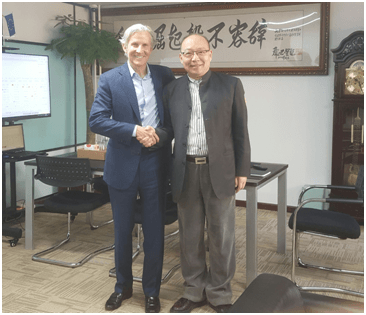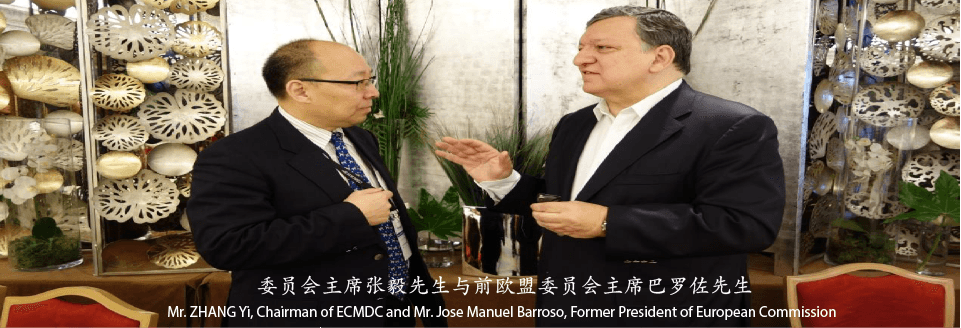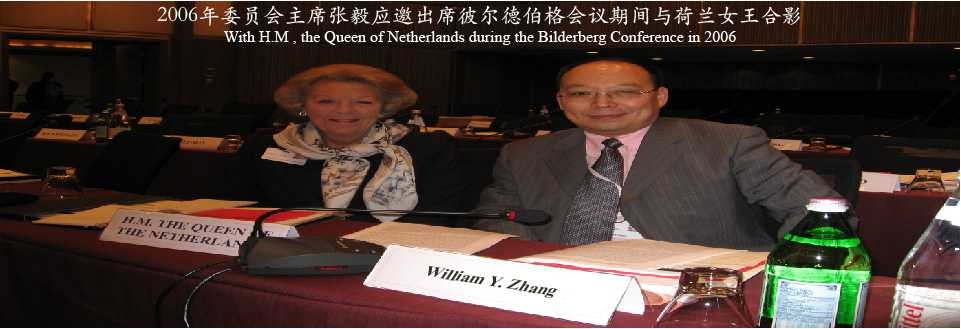The Publication of the Article by Senior Advisor to ECMDC
2016-12-06
Mr. William A. Mundell, Senior Advisor to ECMDC recently wrote the article concerning Sino-American relationship, which was published on the official website of Forbes.

Mr. ZHANG Yi and Mr. William A. Mundell
U.S. Public Opinion Is Driving Us to Re-Fight 20th-Century Economic Wars With China
William A. Mundell
Mr. Mundell is an entrepreneur and honorary professor at Tsinghua University.
"When important things are addressed first, secondary issues will not be difficult to settle"--or so goes the Chinese proverb. The laundry list of issues afflicting the U.S.-China relationship is long and arduous, but none is more fundamental than public opinion and the constraints it imposes on the ability of both sides to move the relationship forward.
George Washington famously said, "With public opinion on our side, we can do anything, without it nothing." U.S. public opinion about China has complicated roots dating back at least to the Chinese Exclusion Act of 1882. But its modern incarnation is based on a fear and a gripe. The fear is that China is destined to overtake the U.S. economically, and in so doing reassert itself into the dominant position it held in eight out of the last ten centuries. The gripe is that China will use any means available to it to win the contest for jobs, and in so doing has decimated the backbone of America, its middle class.
Putting aside the merits of these deeply ingrained feelings, their mere existence has a hugely consequential effect on the direction of the U.S.-China relationship. We hear constant calls for a retrenchment, a retreat from a deepening relationship in the face of lingering disagreements when the correct policy to cure the fear and the gripe is the exact opposite. Instead of addressing these concerns, public opinion is creating a rationale for policies that likely will only reinforce those same opinions.
The rebalancing of the Chinese economy is taking two forms: diversification away from exports toward a consumer economy, and a shift from domestic investment toward international investment. Both are taking place with astonishing speed. China has embarked on an unprecedented spending spree, rebuilding the infrastructure not only of its near neighbors but also of nations throughout Latin America and Africa. It has a mega-pipeline project in Russia for natural gas and has laid plans to help refurbish Europe's aging infrastructure.
Owing in no small part to negative public opinion toward China, the United States is being left out of this rebuilding bonanza at a time when our balance sheet can ill afford it. Recycling China's trade surpluses to rebuild American infrastructure would not only make a dent in our massive infrastructure deficit, and thus strengthen America, but every investment dollar that comes to America is an investment dollar that didn't go to another country to create soft power for China. So if the goal is to mitigate the fear created by the rise of China, closing off America to Chinese investment creates the opposite outcome. This is true regardless of whether China is looking for a peaceful rise or to become the dominant leader and replace the U.S. in that role.
For the first time in a generation, the United States has the real prospect of winning back the jobs it lost from China. The gift that America gave to China--markets--is a gift the Chinese are about to give back to America. With the rise of its middle class, China is rapidly transforming itself from the world's largest factory to the world's largest market. Today, China's middle class is equal to the entire U.S. population and is expected to double in size in the next 5-10 years. Absent a significant protectionist tilt, it is virtually guaranteed that China will be a bigger market for our exports than Mexico or Canada. Moreover, because China has largely bypassed in-person shopping in favor of online shopping, its consumer market is more accessible to small- and mid-sized U.S. businesses.
The sober reality is that as long as it continues to be an article of faith in the U.S. that the U.S.-China relationship is an economic zero-sum game with China's gain being America's loss, we will run the risk of missing this opportunity. Public opinion will hinder the adoption of more open policies that, by helping us win the current jobs contest, could ultimately change public perception of the U.S.-China relationship. Instead, we stay stuck in the past, like the generals hatching brilliant strategies to win the last war that will never come again.
The forces of globalization are inexorable, impersonal and agnostic with respect to their victims. China is now experiencing significant disruption of its own labor force with jobs fleeing to Southeast Asia and Africa. That is the nature of free trade. What is essential if we are to stay engaged in this system which has powered global growth since the end of World War ll is that we not lose the opportunity to capitalize on the new markets created by American investment simply because public opinion is still reeling from job losses produced by the last round of globalization with China. That would be the worst of both worlds.
To break through the prevailing narrative, American leadership is needed. We have two candidates for president who have calculated that it's better to fan the flames of protectionism than to lead Americans to their rightful job bounty--a bounty we earned through our investment (and no small sacrifice) in creating the Chinese middle class.
Instead of consigning the U.S.-China relationship to terms like "constructive engagement" and "living with our differences," we need to raise the expectations of what the US-China relationship can be. The rise of China does not have to mean the decline of America. For the first time in history, two rival powers could develop together, and the U.S.-aided development of China could be responsible for the redevelopment of America. That may well be the best strategy to make America great again.





